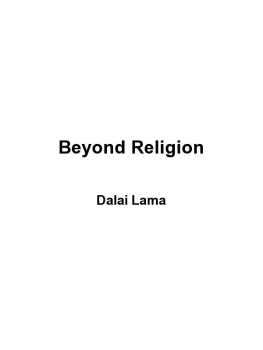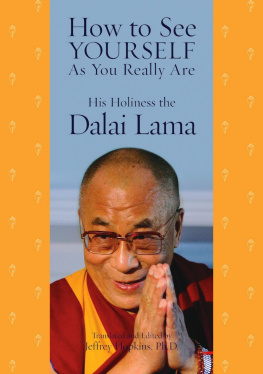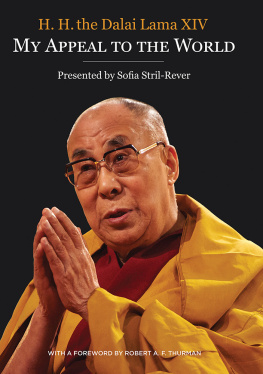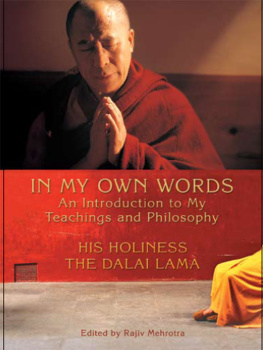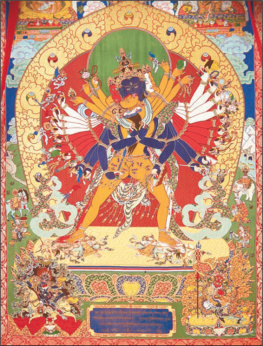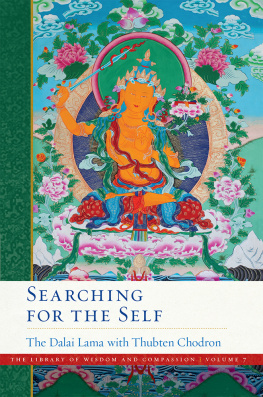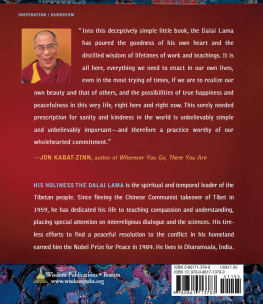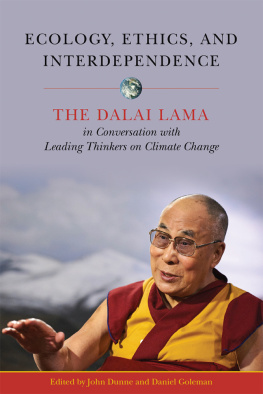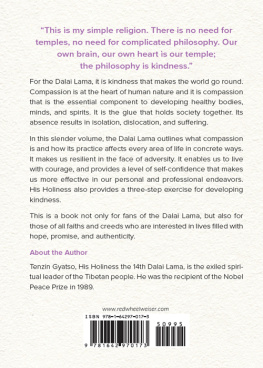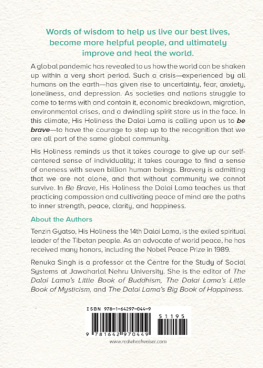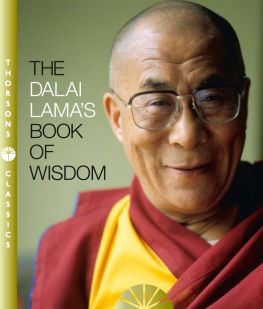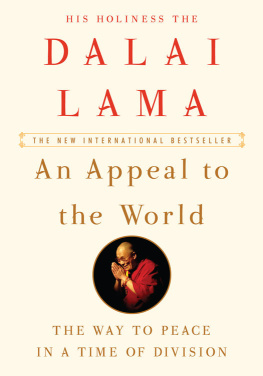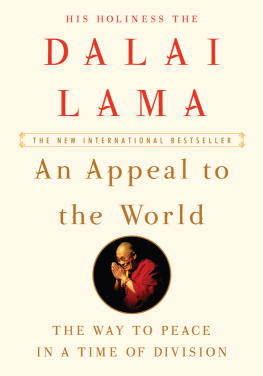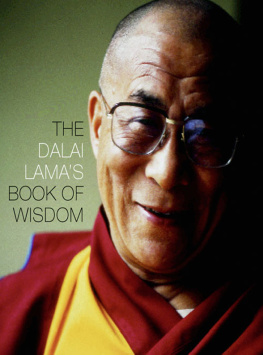Copyright 2011 His Holiness the Dalai Lama
All rights reserved
For information about permission to reproduce selections from this book,
write to Permissions, Houghton Mifflin Harcourt Publishing Company,
215 Park Avenue South, New York, New York 10003.
www.hmhbooks.com
Library of Congress Cataloging-in-Publication Data
Bstan-'dzin-rgya-mtsho, Dalai Lama XIV, 1935
Beyond religion: ethics for a whole world/His Holiness the Dalai Lama.
p. cm.
ISBN 978-0-547-63635-1
1. Ethics. 2. Values. 3. Secularism. I. Title.
BJ 1012. B 739 2011
170'.44dc23
2011028558
Book design by Melissa Lotfy
Printed in the United States of America
DOC 10 9 8 7 6 5 4 3 2 1
Acknowledgments
In the writing of this book, I have been fortunate to have been assisted by the same editorial team that worked on my previous book, Ethics for the New Millennium, with the addition of one or two others. I would therefore like to acknowledge with gratitude the efforts of the concerned members of my Private Office, the invaluable help of my long-time translator, Thupten Jinpa Langri, and the editorial attention of Alexander Norman and his associate George FitzHerbert.
It is my sincere hope that what is written here may contribute, in however small a way, to building a more compassionate and more peaceful world. Of course we are not going to change the world overnight. And we will not change it with a short treatise such as this one. Change will come gradually through increased awareness, and awareness will only come with education. If the reader finds anything written here to be of benefit, then our endeavors will have been well rewarded. A reader who finds no such benefit should not feel any awkwardness about setting this book aside.
The Dalai Lama
Dharamsala, 2nd June 2011
Introduction
I am an old man now. I was born in 1935 in a small village in northeastern Tibet. For reasons beyond my control, I have lived most of my adult life as a stateless refugee in India, which has been my second home for over fifty years. I often joke that I am India's longest-staying guest. In common with other people of my age, I have witnessed many of the dramatic events that have shaped the world we live in. Since the late 1960s, I have also traveled a great deal, and had the honor to meet people from many different backgrounds: not just presidents and prime ministers, kings and queens, and leaders from all the world's great religious traditions, but also a great number of ordinary people from all walks of life.
Looking back over the past decades, I find many reasons to rejoice. Through advances in medical science, deadly diseases have been eradicated. Millions of people have been lifted from poverty and have gained access to modern education and health care. We have a universal declaration of human rights, and awareness of the importance of such rights has grown tremendously. As a result, the ideals of freedom and democracy have spread around the world, and there is increasing recognition of the oneness of humanity. There is also growing awareness of the importance of a healthy environment. In very many ways, the last half-century or so has been one of progress and positive change.
At the same time, despite tremendous advances in so many fields, there is still great suffering, and humanity continues to face enormous difficulties and problems. While in the more affluent parts of the world people enjoy lifestyles of high consumption, there remain countless millions whose basic needs are not met. With the end of the Cold War, the threat of global nuclear destruction has receded, but many continue to endure the sufferings and tragedy of armed conflict. In many areas, too, people are having to deal with environmental problems and, with these, threats to their livelihood and worse. At the same time, many others are struggling to get by in the face of inequality, corruption, and injustice.
These problems are not limited to the developing world. In the richer countries, too, there are many difficulties, including widespread social problems: alcoholism, drug abuse, domestic violence, family breakdown. People are worried about their children, about their education and what the world holds in store for them. Now, too, we have to recognize the possibility that human activity is damaging our planet beyond a point of no return, a threat which creates further fear. And all the pressures of modern life bring with them stress, anxiety, depression, and, increasingly, loneliness. As a result, everywhere I go, people are complaining. Even I find myself complaining from time to time!
It is clear that something is seriously lacking in the way we humans are going about things. But what is it that we lack? The fundamental problem, I believe, is that at every level we are giving too much attention to the external, material aspects of life while neglecting moral ethics and inner values.
By inner values I mean the qualities that we all appreciate in others, and toward which we all have a natural instinct, bequeathed by our biological nature as animals that survive and thrive only in an environment of concern, affection, and warmheartednessor in a single word, compassion. The essence of compassion is a desire to alleviate the suffering of others and to promote their well-being. This is the spiritual principle from which all other positive inner values emerge. We all appreciate in others the inner qualities of kindness, patience, tolerance, forgiveness, and generosity, and in the same way we are all averse to displays of greed, malice, hatred, and bigotry. So actively promoting the positive inner qualities of the human heart that arise from our core disposition toward compassion, and learning to combat our more destructive propensities, will be appreciated by all. And the first beneficiaries of such a strengthening of our inner values will, no doubt, be ourselves. Our inner lives are something we ignore at our own peril, and many of the greatest problems we face in today's world are the result of such neglect.
Not long ago I visited Orissa, a region in eastern India. The poverty in this part of the country, especially among tribal people, has recently led to growing conflict and insurgency. I met with a member of parliament from the region and discussed these issues. From him I gathered that there are a number of legal mechanisms and well-funded government projects already in place aimed at protecting the rights of tribal people and even giving them material assistance. The problem, he said, was that because of corruption these programs were not benefiting those they were intended to help. When such projects are subverted by dishonesty, inefficiency, and irresponsibility on the part of those charged with implementing them, they become worthless.
This example shows very clearly that even when a system is sound, its effectiveness depends on the way it is used. Ultimately, any system, any set of laws or procedures, can only be as effective as the individuals responsible for its implementation. If, owing to failures of personal integrity, a good system is misused, it can easily become a source of harm rather than a source of benefit. This is a general truth which applies to all fields of human activity, even religion. Though religion certainly has the potential to help people lead meaningful and happy lives, it too, when misused, can become a source of conflict and division. Similarly, in the fields of commerce and finance, the systems themselves may be sound, but if the people using them are unscrupulous and driven by self-serving greed, the benefits of those systems will be undermined. Unfortunately, we see this happening in many kinds of human activities: even in international sports, where corruption threatens the very notion of fair play.
Next page
